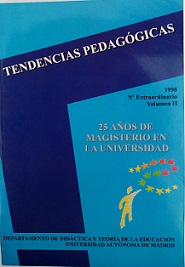Los grupos de trabajo de los profesores como actividad autoformativa para crear una cultura colaborativa.
Résumé
Tendencias pedagógicas
Téléchargements
Références
BANDURA, A. (1984) Teoría del Aprendizaje Social. Madrid: Espasa Calpe,
BANDURA, A. (1987) Pensetniento y acción. Fundenientos sociales. Barcelona: Martínez Roca.
BARKER, J.R. (1993) «Tightening the Iron Cage: Concertive control in self-managing teams», Adniinistretive Science Quartely, 38 (3), 408·437.
BECKHARD, R. and PRITCHARD, V. (1993) Estrategias para el cambio. Barcelona: Parramón,
BERNTHAL, P.R. and INSKO, Ch. A. (1993) «Cohesiveness without groupthink». Group&Organization Mensgenient, 18 (1),66·87.
BRUER, ].T. (1993) Scliools for Tlvougiit. London: The MIT Press.
BUHLER and McCANN , M. (1989) «Builcling your management team», Supervision 50 (9),14·26.
CASEY, D.; ROBEH.TS, P. and SALAMAN, G. (1992) «Facilitating Learning in Groups», Leadership & Organization Develootnent[ournl, 13 (4), 8·13.
COGHLAN, D. (1994) «Managing organizational change through teams and groups». Leadersliip & Organization De velopnicnt [ournel, 15 (2), 18·23.
FAWCETT, V. (1994) Learning Through Discussion. Lonclon: Sage Publications
FRANCIS, D. ancl YOUNG, D. (1989) lmproving Vork Groups: A practical menuel for teambuilding. California :University Associates.
GIL RODRIGUEZ, F. y GARCÍA SAIZ, M. (1993) Grupos en las Organizaciones. Maclricl: Eudema,
GONZÁLEZ, P.; SILVA, M.; CORNE]O, ].M. (1996) Equipos de trabajo Efectivos. Barcelona: E.U.B.
GONZÁLEZ, P. (1995) Orientaciones Teóricas Fundenientelcs en Psicologtn de los grupos. Barcelona: E.U.B.
GONZÁLEZ, P. y VENDIELL, E. (1996) El grupo de experiencia corno instrumento de Iornieción. Barcelona: E.U.B.
HARRIS,P. anclHARH.IS,D. (1989) «High performance tearn rnanagernent». Leetdership and Organization Developinent, 10 (4), 28·32.
HOEK, D.,TERVEL,J. anclEEDEN van clen P. (1995) «Social anclCognitive Strategies in small group learning». Paper presented at the 6th Europen Conference Research on
Learning and Instruction, Nijmegen, The Netherlands, August 1995.
HOLLY, P. and SOUTHVOITH, G. (1989) The tlcveloping sciiool. Lonclon: The Falmer Press.
HOPKINS, D.; AINSCOV, M. ancl lEST, M. (1994) Scliool lmprovement: in an era of change. Lonclon: Cassell.
JEHN, K.A. (1995) «A Multimcthod examination of the benefits ancl detrirnents of intragroup conflict». Adniinistrntive Science Quartely, 40 (2), .256·282.
KELLEY, C. (1995) Teacher Conipensetion and orgenizstion. San Francisco: AERA
KNOWLES, M. (1984) The adult learner: a negleted species. Houston: Gull.
KOLB, D.A.(1984) Experiential Learning. New Jersey: Prentice Hall P.T.R.
KRUEGER, R.A. (1991) El grupo de discusión. Madrid: Pirámide
KRUEGER, R.-A. (1994) Focus Groups. London: Sage Publications.
LAMBER,R.A.;LARCKER, D.F. yWEIGELT, K. (1993) «Thestructure ofOrganizational Incentives». Administretive Science Quartely, 38 (3), 438-461.
LANZA, P. (1985) «TeatTI Appraisals». Personnel [ournel, 64,47- 52.
LEWIN,K. (1978) La teoría del campo en la ciencia social. Buenos Aires: Paidós.
UTTLE, J.W. and McLAUGHLIN, M.W. (1993) Teachers' Work Indi viduals, colleagues, and contexts. New York and London: Teachers Collegue, Columbia
University
MANNIG, ~K. (1992) Organizational Communicetion. New York: Hawthorne,
MARCELO, C. et al. (1996). Educational Innovations as Staff Development: an evaluative approach. British Journal ofln-Service Educetion, 22 (2), 185-201.
MULLINS, T.W. (1994) StaffDevelopnlent ProgreinsA Guide to Evaluation. California: Corwin Press, Inc.
PAYNE,. R. y COOPER, C.L (1986) Grupos de trabajo en organizaciones. México: Limusa
PEIRÓ, ].(1990) Organizaciones: Nuevas Perspectivas Psicosociológicas. Barcelona: PPU.
PEIRÓ, J.M. y PRIETO, F. (1996) Tratado de Psicología del Trabajo .Madrid: Síntesis
ROGERS, C. (1973) Grupos de Encuentro. Buenos Aires: Amorrortu
SALEM, M.A.and BANNER,D.K. (1992) «Self-managing WorkTeams: An Internacional Perspective» Leedersliip & Development[ournsl, 13 (7), 3-8.
SCHACK, G.; OVERTURF, B.]. (1994) Profesional Developtnent Teams: Stepping stone (or next best tliing) to professional developtnent schoois. New Orleans:
AERA
SCHEIN, E.H. y BENNS, V.G. (1980) El cambio personal y organizacional a través de métodos grupales. Barcelona: Herder
SENGE, P. M. (1995) La quinta disciplina en la práctica. Barcelona: Granica
SENGE, P.M. (1993) La quinta disciplina. Barcelona: Granica.
SMITH, K.G. and others (1994) «Top Management Tearn Dernography and process: The rolesocialintegration and cOlnnlunication».AdI11inistrativexience Quartel, 39 (3), 412-438.
SMYLIE, M.A, (1994) Teacher learning in tlie votkpl«ce: implications Ior school reiortn. New Orleans, A.E.R.A.
STOTT, K.and WALKER, A. (1995) Tealns. Teemwotlc & Teembuilding. New York: Prentice Hall
WEST, M.A. (1994) Effective Teanl Vork. The British Psychological Society.
WILSON, ].D. (1992) Cómo valorar la calidad de la Enseñenzs. Barcelona: Paidós M.E.C. WINTER, R. y otros (1989) Learning [tom Experience:Principles and practice in Action-Resesrch. London: The Falrner Press.
